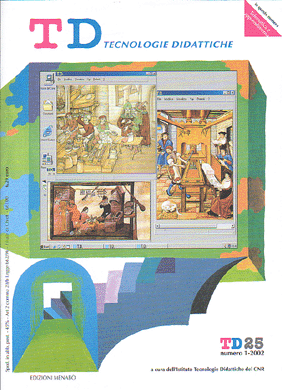The assessment in distance education: a glimmer on the horizon
Main Article Content
Abstract
Article Details
Section
Authors who publish with this journal agree to the following terms:
- Authors retain copyright and grant the journal right of first publication with the work simultaneously licensed under a Creative Commons CC BY 4.0 Attribution 4.0 International License.
- Authors are able to enter into separate, additional contractual arrangements for the non-exclusive distribution of the journal's published version of the work (e.g., post it to an institutional repository or publish it in a book), with an acknowledgement of its initial publication in this journal.
- Authors are permitted and encouraged to post their work online (e.g., in institutional repositories or on their website) prior to and during the submission process, as it can lead to productive exchanges, as well as earlier and greater citation of published work (See The Effect of Open Access)
References
Benigno V, Trentin G., (1999), La valutazione nella formazione a distanza, in Trentin G. (a cura di) Telematica e foramzione a distanza . Il caso Polaris, Franco Angeli, Milano, pp. 207-227.
Berelson B. (1952), Content analysis in communication research, Free Press, Illinois.
Bocconi S., Midoro V., Sarti L.. (1999), Valalutazione della qualità nella formazione in rete, TD - Tecnologie Didattiche, n. 16, ed. Menabò, Ortona, pp. 24-40.
Borg W., Gall M. (1989), The methods and tools of observational research, In W. Borg & M. Gall (Eds.) Educational research: An introduction (5th ed.) (pp. 473-530), Longman, London.
Bullen M. (1998), Participation and critical thinking in online university distance education, Journal of Distance Education, vol.13(2), pp.1-32.
Capozzoli M., McSweeney L., Sinha, D. (1999), Beyond kappa: A review of interrater agreement measures. The Canadian Journal of Statistics, vol. 27(1), pp. 3-23.
Garrison D. R. (1991), Critical thinking and adult education: A conceptual model for developing critical thinking in adult learners, International Journal of Lifelong Learners, vol.10(4), pp. 287-303.
Gunawardena C., Lowe C., Anderson T. (1997), Analysis of a global online debate and the evelopment of an interaction analysis model for examining social construction of knowledge in computer conferencing, Journal of Educational Computing Research, vol.17(4), pp. 395-429.
Hara N., Bonk C., Angeli C., (2000), Content analyses of on-line discussion in an applied educational psychology course, Instructional Science, vol. 28(2), pp.115-152.
Henri F. (1992), Computer conferencing and content analysis. In A. Kaye (Ed.) Collaborative learning through computer conferencing: The Najaden papers, (pp. 117-136), Springer-Verlag, London.
Hiltz, S. R. (1990), Evaluating the virtual classroom. In L.M. Harasim (Ed.), Online education: Perspectives on a new environment (pp. 133- 183). Praeger, New York.
Howell-Richardson, C. Mellar, H. (1996), A methodology for the analysis of patterns of participation within computer mediated communication courses, Instructional Science, vol. 24, pp. 47-69.
Kanuka H., Anderson T. (1998), On-line social interchange, discord, and knowledge construction, Journal of Distance Education, vol. 13(1), pp. 57-74.
Levin J. A., Kim H., Riel M. M. (1990), Analyzing Instructional Interactions on Electronic Message Networks. In L. M. Harasim (Ed.). Online education: Perspectives on a new environment, Praeger, New York.
Mason R. D. (1991), Analyzing computer conferencing interactions, Computers in Adult Education and Training, vol. 2(3), pp. 161-173.
Newman G., Johnson C., Webb B. Cochrane C. (1997), Evaluating the quality of learning in computer supported cooperative learning, Journal of the American Society for Information Science, vol. 48(6), pp. 484-495.
Newman G., Webb B., Cochrane C. (1995), A content analysis method to measure critical thinking in face-to-face and computer supported group learning, Interpersonal Computing and Technology, vol. 3(2), 56- 77. In Internet http://www.helsinki.fi/s cience/optek/1995/n2 /newman.txt
Olimpo G., (1999), Qualità, educazione, tecnologia. TD - Tecnologie Didattiche, n. 16, ed. Menabò, Ortona, pp. 4-9.
Riel M., Harasim L. (1994), Research perspectives on network learning. Machine Mediated Learning, vol. 4(2-3), pp. 91-113.
Rourke, L., Anderson, T., Garrison, D. R., & Archer, W. (2001). Methodological issues in the content analysis of computer conference transcripts, International Journal of Artificial Intelligence in Education. In press.
Ruggieri S., Boca S., Ballor F. (2002), Il progetto STRADA: un caso di Formazione a Distanza in ambito universitario, in TD - Tecnologie Didattiche, n. 25, ed. Menabò, Ortona.
Simoff S. (2000), Monitoring and Evaluation in Collaborative Learning Environments. http://kn.cilt.org/ cscl99/A83/.
Thorpe M. (1995), The challenge facing course design, in Lockwood, F. (Ed.), Open and distance learning today, Routledge, New York

